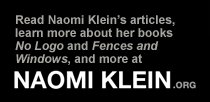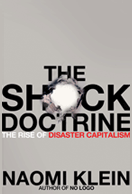The Shock Doctrine

Disaster Capitalism in Action: cambodia
Cambodian Government 'Complicit' in Forced Evacuations
Seth Mydans, International Herald Tribune, July 17, 2008
"Like tens of thousands around the country, the people here are victims of what experts say has become the most serious human rights abuse in the country - land seizures, forced evictions and homelessness....Between 1993 and 1999, Amnesty International said in its report, the government granted concessions for around one-third of the country's most productive lands for commercial development by private companies.
"In Phnom Penh, between 1998 and 2003, the city government forcibly evicted 11,000 families, the World Bank said. Since then, Amnesty International said, forced evictions have reportedly displaced at least 30,000 more families.
"'One thing that is important to note is that the government is not only failing to protect the population but we are also seeing that it is complicit in many of the forced evictions,' said [Brittis] Edman of Amnesty International."
Cambodia: Country for Sale
Adrian Levy and Cathy Scott-Clark , Guardian, April 26, 2008
"The troubled kingdom of Cambodia, a precarious debtor-nation underpinned by more than £500m of hand-outs from the international community, had suddenly found itself a refuge for cash and speculators fleeing paralysed western financial markets. As London and New York, overcome by the US sub-prime crisis, began grinding to a halt last year, many in the City had moved on, transferring liquid assets to the east....
"Foreign fund managers had started pitching up in Phnom Penh wearing linen shirts and khaki drip-dry jungle wear, alerted by the country's unexpected boom in tourism that in 2006 had seen one-and-a-half million visitors overcome the west's collective memories of Cambodia's recent past to travel to the temples of Angkor Wat. Enticed also by indicators that suggested the feeble economy was turning a corner, super-rich, predominately British, French and Swiss speculators, fuelled by a high-risk machismo, came hunting for profits of 30% or more. Their interest was land speculation: buying up large sites in developing countries that they would then sit on in the hope that, with the influx of tourists, land values would soar.
"Hun Sen and his ruling Cambodian People's Party (CPP) have, in effect, put the country up for sale. Crucially, they permit investors to form 100% foreign-owned companies in Cambodia that can buy land and real estate outright - or at least on 99-year plus 99-year leases. No other country in the world countenances such a deal. Even in Thailand and Vietnam, where similar land speculation and profiteering are under way, foreigners can be only minority shareholders.
"There were other inducements. Many foreign funds - hedge funds, property funds, private equity funds - operating on the outer margins of the financial world thrive on complexity, risk and maximising profit. In Phnom Penh, they found an ideal partner in the prime minister, who has created a unique business environment. Since the mid-90s, Hun Sen and the CPP have declined to enforce money-laundering legislation and have concerned themselves little with the probity of investors. Foreign businessmen were offered nine-year tax holidays, and were allowed to hold their cash in US dollars in banks outside the country....
"The sale of the century continued with the mainland beaches. At the end of January, the Sokha Hotel Group, run by Sok Kong, a Cambodian oligarch and Hun Sen ally, was confirmed as the new owner of the lion's share of Occheuteal Beach, the largest and most popular public dune in the region, which was closed off to make way for a 1,000-room hotel and golf course. The deal was originally negotiated in June 2006 when, local fisherman told us, bulldozers and 10 trucks of armed men demolished 71 homes and 40 local restaurants....
"What will this mean for people such as Sang Run, who is now surviving in a makeshift home behind Independence Beach? Has the legacy of the Khmer Rouge been purged? Naly Pilorge, director of Licadho, a local human rights NGO, thinks not: 'Everyone claims Cambodia has come through the period of barbarism, but the sadism is still bubbling beneath the surface. Extreme violence, greed and disregard for the most basic human rights - of giving people a place to live - are still with us daily. The methods of the past are being used to dictate our future.'"














